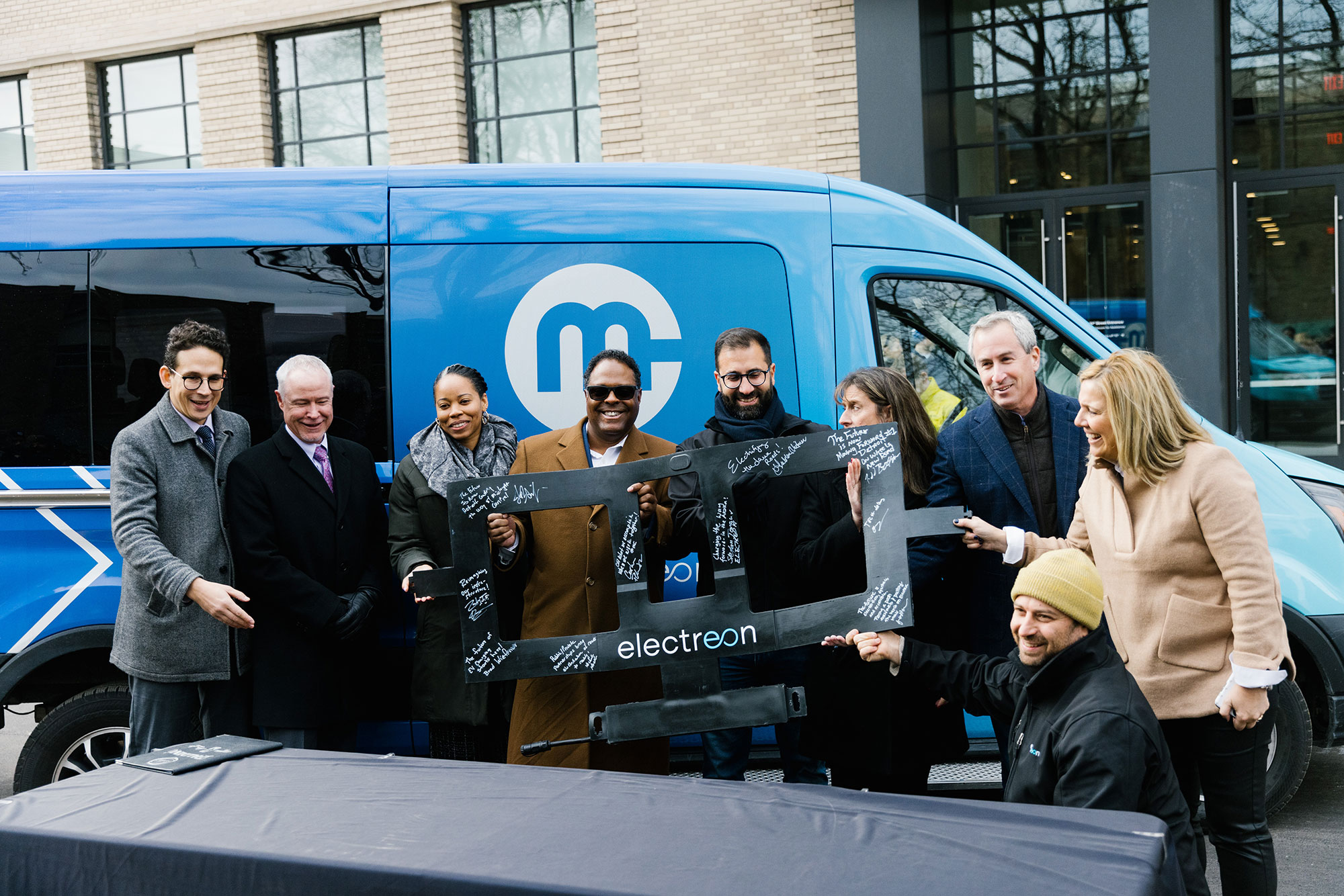MDOT, City of Detroit and Electreon unveil nation’s first public EV-charging roadway at Michigan Central
November 28, 2023
Detroit Deputy Mayor Todd Bettison, Michigan Department of Transportation (MDOT) Director Brad Wieferich and other partners celebrated a major milestone in the future of mobility and electrification today at the Michigan Central innovation district in Detroit as crews have finished installing the nation’s first wireless-charging public roadway.
Using technology from Electreon, 14th Street is now equipped with inductive-charging coils between Marantette and Dalzelle streets that will charge electric vehicles (EVs) equipped with Electreon receivers as they drive on the road. The road will be used to test and perfect this wireless-charging technology in a real-world environment and perfect it ahead of making it available to the public in the next few years, helping to further establish Michigan and Detroit as leaders in innovation and technology.
“We’re excited to spearhead the development and deployment of America’s first wireless charging road,” said Dr. Stefan Tongur, Electreon vice president of business development. “This milestone stands as a testament to our collaborative efforts with the State of Michigan and MDOT, the City of Detroit, Michigan Central, Ford, Mcity, Jacobs, Next Energy, DTE, and others. Alongside Michigan’s automotive expertise, we’ll demonstrate how wireless charging unlocks widespread EV adoption, addressing limited range, grid limitations, and battery size and costs. This project paves the way for a zero-emission mobility future, where EVs are the norm, not the exception.”
The move toward electrification is widely touted by Gov. Gretchen Whitmer, who announced the pilot initiative in September 2021 to develop the nation’s first wireless charging infrastructure on a public road in Michigan. MDOT and Electreon have entered a five-year commitment to develop the electric road system (ERS), piloting the technology on Michigan roads.
Electreon’s wireless charging technology is based on inductive coupling between copper coils installed below the road surface and receivers installed on electric vehicles. When a vehicle with a receiver nears the in-road charging segments, the road transfers electricity wirelessly through a magnetic field. This electricity is then transferred as energy to the vehicle’s battery. These charging segments can transfer wireless electricity to the receiver either when the vehicle is parked (static charging) or is driving (dynamic charging). The electric road is safe for drivers, pedestrians and wildlife. Each coil in the road is activated only when a vehicle with an approved receiver passes over the coil. This ensures that energy transfer is controlled and provided only to vehicles that require it.
“Michigan has always been at the forefront of innovation in mobility, and that forward-thinking is on display with the latest advances in inductive charging from Electreon, the first deployment of this electric vehicle charging technology in the United States,” said Chief Mobility Officer Justine Johnson of the Office of Future Mobility and Electrification. “This latest milestone supports the goals of the MI Future Mobility Plan to grow Michigan’s mobility leadership, and proves that companies like Electreon can test and deploy the newest innovations right here in Michigan.”
MDOT and Electreon, a Newlab at Michigan Central member company, agreed to install a combined mile of inductive-charging roadway in Detroit’s historic Corktown neighborhood. 14th Street, owned and maintained by the City of Detroit, now has a quarter-mile segment of wireless charging roadway. The charging road runs alongside the Newlab at Michigan Central Building, home to more than 60 tech and mobility startups, allowing for the further testing and advancement of this next-generation technology. In 2024, MDOT will begin seeking bids to rebuild part of US-12 (Michigan Avenue), which will see additional inductive charging installed. Electreon has also installed two static inductive charging stations in front of Michigan Central Station, which will be able to charge Electreon-equipped vehicles while they are parked.
“We are excited to partner with MDOT, the City of Detroit and Electreon to bring the future of roads to Michigan,” said Michigan Central CEO Joshua Sirefman. “This is what Michigan Central is all about, not only convening key partners across the public and private sectors to fuel innovation and create jobs and investment in Detroit, but also providing the environment to safely test and hone technology like Electreon in real time and in the real world. It is through this collaboration and advancement that Michigan Central is helping to tackle global problems and fast-track solutions to many of our greatest mobility challenges.”
As the auto capital of the world, Michigan stands ready to lead the nationwide charge toward electrification of our vehicles and roadways. Partnering with industry to develop and test these new technologies will help develop the blueprint necessary to introduce wireless charging roads nationwide.
“For more than a century, Detroit has been known around the world as the leader in transportation innovation,” said Detroit Mayor Mike Duggan. “We are the birthplace of the auto industry, and the home of the first mile of concrete road and the first three-way traffic signal. Today, thanks to Gov. Whitmer and our partners at Michigan Central and Electreon, we can add the nation’s first wireless charging public roadway to that list of innovations.”
Remaining work along 14th Street is expected to continue through the end of 2023, with extensive testing of the inductive charging technology beginning in early 2024. Using a Ford E-Transit electric commercial van provided by Ford Motor Co. and equipped with the Electreon receiver, staff will test the efficiency and operations of the vehicle and study potential long-term public transportation opportunities.
“Developing electrified roadways may be the catalyst to accelerate interest and acceptance of EVs for all consumers,” said MDOT Director Bradley C. Wieferich. “Making it easier for EV users to find a reliable charging source without disrupting their commute supports both fleet operations and passenger travel. We’re proud to collaborate with private industry partners and the City of Detroit to support these important initiatives leading us toward a more sustainable future with fewer emissions.”


